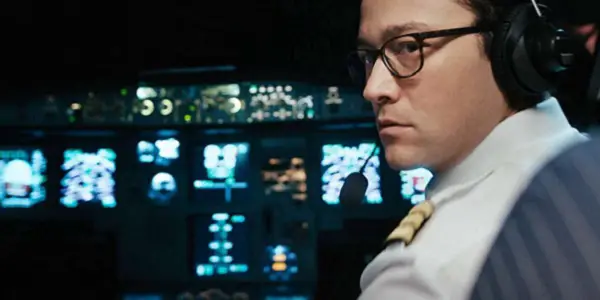Patrick Vollrath, the German filmmaker whose acclaimed short Everything Will Be Okay was nominated for an Academy Award in 2016, makes his feature-length directorial debut with 7500, a tightly-wound tale of terrorists hijacking a plane departing from Berlin. Taking place almost entirely within the tiny c*ckpit of the plane, and seemingly in real-time, the film is not without moments of great tension — not to mention a solid performance from star Joseph Gordon-Levitt. Nonetheless, one is left with a sense of unfulfilled potential as the end credits roll.
Up in the Air
Tobias Ellis (Gordon-Levitt) is the American First Officer accompanying Captain Michael Lutzmann (Carlo Kitzlinger) on a flight bound for Paris from Berlin. An exceedingly reserved individual — perhaps in part to being the only non-German on the flight crew — Tobias struggles to exchange pleasantries with the captain as they conduct their pre-flight checks. Indeed, it takes extraordinary effort on the part of the captain to learn that Tobias is not only acquainted with flight attendant Gökce (Aylin Tezel) but raising a young son with her. That both mother and father are working the same flight seems like a bit of scheduling that never should have been allowed to happen — after all, what if something happens to the plane?

Unfortunately, something does. Terrorists use broken glass to hijack the plane, storming the c*ckpit and critically injuring the captain. After knocking one hijacker unconscious and locking the rest out of the c*ckpit, Tobias begins the process of reporting the incident to the authorities, who order him to divert the flight to Hannover — and, most importantly, to not give in to the demands of the hijackers. No matter what they say or do, he must not open the doors to the c*ckpit. However, when the brutal leader of the hijackers shows that he has no qualms about executing hostages — and takes Gökce captive — Tobias’ professional calm threatens to give way to personal rage.
Tension and Turbulence
The entirety of 7500 from this point takes place inside the c*ckpit; the only exposure the audience gets to the activity in the cabin is from the security camera screen in the c*ckpit and a few brief glimpses through the opened door. As someone who already feels claustrophobic on planes, this decision on the part of Vollrath ensured that my anxiety was at a fever pitch for the majority of the film. This feeling is only accentuated by Sebastian Thaler’s cinematography, necessarily reliant on tight shots and close-ups that make you feel as though you are right there with Tobias in his predicament.
While an intriguing filmmaking choice, there are some downsides to confining the film’s action to this small space, particularly when the passengers begin to rebel against the hijackers after Tobias informs them over the intercom that the hijackers are poorly armed. To focus 7500 on the quieter, less action-oriented activity inside the c*ckpit is a unique choice for an action subgenre that has been explored so many times before. It is also one that forces you to identify and sympathize with the hero more than usual, as you essentially see the entire film through his eyes, confined to his perspective. But it also left me hungry for knowledge of what was going on in the rest of the plane, so I cannot say it was entirely successful.
Said c*ckpit activity predominantly involves Tobias connecting with Vedat (Omid Memar), the youngest and most sensitive of the hijackers. While Vedat believes in their mission of hijacking and crashing the plane, sending a message to white Europeans that acts of violence against Muslims will not be tolerated, he’s also reluctant to die. Torn between his loyalty to the cause and his desire to survive — not to mention, his disgust at his fellow hijacker’s murder of innocent hostages — Vedat’s conversations with Tobias, who calmly attempts to connect with the young man on a personal level, are the most compelling parts of the film.
When Vedat realizes that Tobias is in a relationship with a Turkish-German woman and lives in the same Turkish enclave of Berlin that he does, it becomes clear to him that the boundaries between their cultures are much blurrier than he has been led to believe. Yet to me, these scenes would have been even more impactful if Tobias had been German; by making him an American, he is more removed from the cultural clashes currently taking place in Germany between white Germans and those of Turkish descent. As a result, it feels as though 7500 merely skims over these issues, which I believe deserve to be delved into more deeply.
As Tobias, Gordon-Levitt is not your typically bombastic action hero, but a reluctant and realistic one; more brains than brawn, he exhibits surprising inner steel when needed to save lives. When his reluctance to mix the personal with the professional is put to the test after Gökce is taken hostage, one can sense his incredible pain — and yet, this doesn’t lead Tobias to charge the hijackers and embark on a rage-fueled revenge spree like it might in a more stereotypical American thriller, where the hero often seems to be more machine than human. His performance keeps 7500 from crashing and burning in its more frustrating moments.
Conclusion
While not without some flaws, 7500 is still a nail-biter of a film, providing a far more cerebral take on the plane hijacking thriller than one has come to expect.
What do you think? What is your favorite film to take place on a plane? Share your thoughts in the comments below.
7500 is currently available to stream on Amazon Prime.
Watch 7500
Does content like this matter to you?
Become a Member and support film journalism. Unlock access to all of Film Inquiry`s great articles. Join a community of like-minded readers who are passionate about cinema - get access to our private members Network, give back to independent filmmakers, and more.